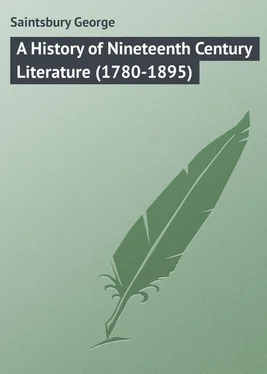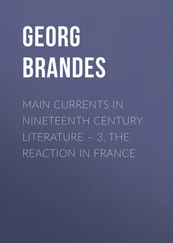George Saintsbury - A History of Nineteenth Century Literature (1780-1895)
Здесь есть возможность читать онлайн «George Saintsbury - A History of Nineteenth Century Literature (1780-1895)» — ознакомительный отрывок электронной книги совершенно бесплатно, а после прочтения отрывка купить полную версию. В некоторых случаях можно слушать аудио, скачать через торрент в формате fb2 и присутствует краткое содержание. ISBN: , Жанр: foreign_prose, на английском языке. Описание произведения, (предисловие) а так же отзывы посетителей доступны на портале библиотеки ЛибКат.
- Название:A History of Nineteenth Century Literature (1780-1895)
- Автор:
- Жанр:
- Год:неизвестен
- ISBN:http://www.gutenberg.org/ebooks/31698
- Рейтинг книги:5 / 5. Голосов: 1
-
Избранное:Добавить в избранное
- Отзывы:
-
Ваша оценка:
- 100
- 1
- 2
- 3
- 4
- 5
A History of Nineteenth Century Literature (1780-1895): краткое содержание, описание и аннотация
Предлагаем к чтению аннотацию, описание, краткое содержание или предисловие (зависит от того, что написал сам автор книги «A History of Nineteenth Century Literature (1780-1895)»). Если вы не нашли необходимую информацию о книге — напишите в комментариях, мы постараемся отыскать её.
A History of Nineteenth Century Literature (1780-1895) — читать онлайн ознакомительный отрывок
Ниже представлен текст книги, разбитый по страницам. Система сохранения места последней прочитанной страницы, позволяет с удобством читать онлайн бесплатно книгу «A History of Nineteenth Century Literature (1780-1895)», без необходимости каждый раз заново искать на чём Вы остановились. Поставьте закладку, и сможете в любой момент перейти на страницу, на которой закончили чтение.
Интервал:
Закладка:
The enormous tolerance of friends, however, which alone enabled him to produce anything, was justified by the astonishing genius to which its possessor gave so unfair a chance. As a thinker, although the evidence is too imperfect to justify very dogmatic conclusions, the opinion of the best authorities, from which there is little reason for differing, is that Coleridge was much more stimulating than intrinsically valuable. His Aids to Reflection , his most systematic work, is disappointing; and, with The Friend and the rest, is principally valuable as exhibiting and inculcating an attitude of mind in which the use of logic is not, as in most eighteenth century philosophers, destructive, but is made to consist with a wide license for the employment of imagination and faith. He borrowed a great deal from the Germans, and he at least sometimes forgot that he had borrowed a great deal from our own older writers.
So, too, precise examination of his numerous but fragmentary remains as a literary critic makes it necessary to take a great deal for granted. Here, also, he Germanised much; and it is not certain, even with the aid of his fragments, that he was the equal either of Lamb or of Hazlitt in insight. Perhaps his highest claim is that, in the criticism of philosophy, of religion, and of literature alike he expressed, and was even a little ahead of, the nobler bent and sympathy of his contemporaries. We are still content to assign to Coleridge, perhaps without any very certain title-deeds, the invention of that more catholic way of looking at English literature which can relish the Middle Ages without doing injustice to contemporaries, and can be enthusiastic for the seventeenth century without contemning the eighteenth. 6 6 Yet this praise can only be assigned to Coleridge with large allowance. He was always unjust to his own immediate predecessors, Johnson, Gibbon, etc.; and he was not too sensible of the real merits of Pope or even of Dryden. In this respect Leigh Hunt, an immeasurably weaker thinker, had a much more catholic taste. And it is not certain that, as a mere prose writer, Coleridge was a very good prose writer.
To him more than to any single man is also assigned (and perhaps rightly, though some of his remarks on the Church, even after his rally to orthodoxy, are odd) the great ecclesiastical revival of the Oxford movement; and it is certain that he had not a little to do with the abrupt discarding of the whole tradition of Locke, Berkeley and Hartley only excepted. Difficult as it may be to give distinct chapter and verse for these assignments from the formless welter of his prose works, no good judge has ever doubted their validity, with the above and other exceptions and guards. It may be very difficult to present Coleridge's assets in prose in a liquid form; but few doubt their value.
It is very different with his poetry. Here, too, the disastrous, the almost ruinous results of his weaknesses appear. When one begins to sift and riddle the not small mass of his verse, it shrinks almost appallingly in bulk. Wallenstein , though better than the original, is after all only a translation. Remorse (either under that name or as Osorio ) and Zapolya are not very much better than the contemporary or slightly later work of Talfourd and Milman. The Fall of Robespierre is as absurd and not so amusing as Southey's unassisted Wat Tyler . Of the miscellaneous verse with which, after these huge deductions, we are left, much is verse-impromptu, often learned and often witty, for Coleridge was (in early days at any rate) abundantly provided with both wit and humour, but quite occasional. Much more consists of mere Juvenilia. Even of the productions of his best times (the last lustrum of the eighteenth century and a lucid interval about 1816) much is not very good. Religious Musings , though it has had its admirers, is terribly poor stuff. The Monody on the Death of Chatterton might have been written by fifty people during the century before it. The Destiny of Nations is a feeble rant; but the Ode on the Departing Year , though still unequal, still conventional, strikes a very different note. The Three Graves , though injured by the namby-pambiness which was still thought incumbent in ballads, again shows no vulgar touch. And then, omitting for the moment Kubla Khan , which Coleridge said he wrote in 1797, but of which no mortal ever heard till 1816, we come to The Rime of the Ancient Mariner and the birth of the new poetry in England. Here the stutters and flashes of Blake became coherent speech and steady blaze; here poetry, which for a century and a half had been curbing her voice to a genteel whisper or raising it only to a forensic declamation, which had at best allowed a few wood-notes to escape here and there as if by mistake, spoke out loud and clear.
If this statement seems exaggerated (and it is certain that at the time of the appearance of the Ancient Mariner not even Wordsworth, not even Southey quite relished it, while there has always been a sect of dissidents against it), two others will perhaps seem more extravagant still. The second is that, with the exception of this poem, of Kubla Khan , of Christabel , and of Love , all of them according to Coleridge written within a few months of each other in 1797-98, he never did anything of the first class in poetry. The third is that these four – though Christabel itself does not exceed some fifteen hundred lines and is decidedly unequal, though the Ancient Mariner is just over six hundred and the other two are quite short – are sufficient between them to rank their author among the very greatest of English poets. It is not possible to make any compromise on this point; for upon it turns an entire theory and system of poetical criticism. Those who demand from poetry a "criticism of life," those who will have it that "all depends on the subject," those who want "moral" or "construction" or a dozen other things, – all good in their way, most of them compatible with poetry and even helpful to it, but none of them essential thereto, – can of course never accept this estimate. Mrs. Barbauld said that The Ancient Mariner was "improbable"; and to this charge it must plead guilty at once. Kubla Khan , which I should rank as almost the best of the four, is very brief, and is nothing but a dream, and a fragment of a dream. Love is very short too, and is flawed by some of the aforesaid namby-pambiness, from which none of the Lake school escaped when they tried passion. Christabel , the most ambitious if also the most unequal, does really underlie the criticism that, professing itself to be a narrative and holding out the promise of something like a connected story, it tells none, and does not even offer very distinct hints or suggestions or what its story, if it had ever been told, might have been. A thousand faults are in it; a good part of the thousand in all four.
But there is also there something which would atone for faults ten thousand times ten thousand; there is what one hears at most three or four times in English, at most ten or twelve times in all literature – the first note, with its endless echo-promise, of a new poetry. The wonderful cadence-changes of Kubla Khan , its phrases, culminating in the famous distich so well descriptive of Coleridge himself —
For he on honey dew hath fed,
And drunk the milk of Paradise,
the splendid crash of the
Ancestral voices prophesying war,
are all part of this note and cry. You will find them nowhere from Chaucer to Cowper – not even in the poets where you will find greater things as you may please to call them. Then in the Mariner comes the gorgeous metre, – freed at once and for the first time from the "butter-woman's rank to market" which had distinguished all imitations of the ballad hitherto, – the more gorgeous imagery and pageantry here, the simple directness there, the tameless range of imagination and fancy, the fierce rush of rhythm: —
Читать дальшеИнтервал:
Закладка:
Похожие книги на «A History of Nineteenth Century Literature (1780-1895)»
Представляем Вашему вниманию похожие книги на «A History of Nineteenth Century Literature (1780-1895)» списком для выбора. Мы отобрали схожую по названию и смыслу литературу в надежде предоставить читателям больше вариантов отыскать новые, интересные, ещё непрочитанные произведения.
Обсуждение, отзывы о книге «A History of Nineteenth Century Literature (1780-1895)» и просто собственные мнения читателей. Оставьте ваши комментарии, напишите, что Вы думаете о произведении, его смысле или главных героях. Укажите что конкретно понравилось, а что нет, и почему Вы так считаете.












